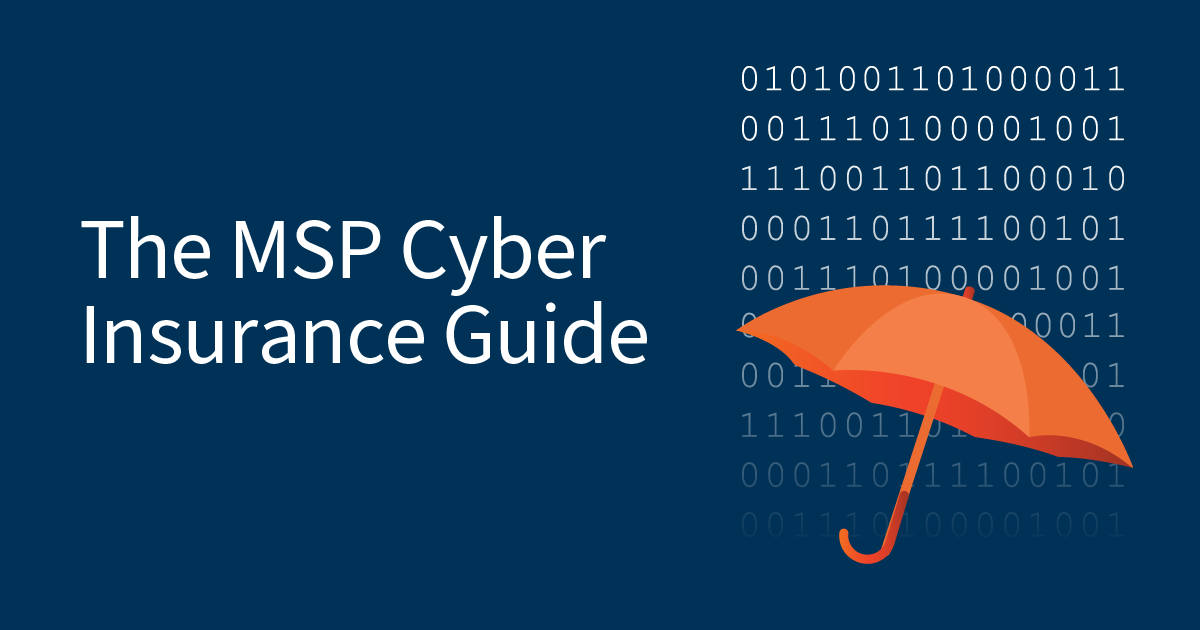
The MSP Cyber Insurance Guide
Table of Contents
Using Automation for Cyber-Insurability
Cyber Insurance is relatively new, but with increasing cyber threats to small to medium-sized businesses (SMBs) – especially Managed Service Providers (MSPs) – it’s gotten harder to get coverage. MSPs are under attack and must have the support of a policy that matches your risk.
To become cyber-insurable, MSPs must meet the requirements of their desired policy. Policy applications can reach over 20 pages and demand substantiation of backup and disaster recovery (BDR) capabilities. Depending on your BDR solution, the thoroughness of your business continuity plan, and your ability to recover after an incident, qualifying for coverage and getting claims paid can be simple or complicated.

What is Cyber Liability Insurance?
Cyber Insurance or cyber liability insurance helps businesses cover financial losses due to cyberattacks or data breaches involving sensitive information.
Policies offer different types of protection based on what scenarios the business wants to receive compensation for after an event occurs. When evaluating your needs, consider today’s threat vectors, your ability to tolerate downtime, the impact of forgoing coverage, and your budget for premiums and recovery expenses. At the bare minimum, MSPs need “must-have coverage.” However, getting a policy that protects you from the costs you’re most likely to incur is best.
Must-Have Coverage:
• Data breaches.
• Cyberattacks on your data.
• Cyberattacks on your client’s data.
• Cyberattacks on any data stored with vendors and other third parties.
• Cyberattacks that occur anywhere in the world – not just the U.S.
Recommended Coverage:
• Cyber extortion, including ransomware and social engineering.
• Regulatory fines or penalties.
• Media liability and reputational losses.
• Business interruptions and downtime.
• Breach response and management expenses.
Why Do MSPs Need Cyber Insurance?
Cyber Insurance is a safety net like health insurance, car insurance, homeowners’ Insurance, etc. However, unlike those other types of Insurance, MSPs are not required to have cyber Insurance to do business. Some see this as an opportunity to cut costs and stick their head in the sand.
We aren’t trying to scare you – if you are reading this blog,, you may realize that you need to both secure your client’s data and be realistic about the level of risk you are taking on:
- High risk.
- No recovery costs are covered.
- No external assistance.
- No compliance penalty compensation.
Proactive MSPs Need Cyber Insurance
Taking a security-first approach to business continuity and disaster recovery means you’re proactive, realistic, and prepared for whatever is possible.
- Low risk.
- Recovery cost coverage.
- Third-party support.
- Compliance fine assistance.
Can You Cover the Cost of a Breach?
There’s no limit to what a cyberattack or data breach could cost your MSP. That’s the thing about cybersecurity – you don’t know what’s coming – and that’s what cyber Insurance covers.
- Expenses to restore normal operations and repair reputable damage – additional labor and disaster recovery tools.
- Replacing damaged property – computers, laptops, mobile devices, and backup hardware.
- Notifying customers of the breach and communicating recovery processes.
- Lost business income due to downtime during and after the incident.
- Legal fees for compliance breach notifications and potential litigation if the MSP is sued.
- Third-party damages from clients, vendors, and other stakeholders who suffered a loss due to the incident.
- Fines imposed by regulatory bodies like GDPR and HIPAA.
- Public relations efforts to manage reputational damage to the MSP.
- Forensic investigation to assess the incident, identify vulnerabilities, and mitigate future risks.
All or none of these costs could be covered depending on your cyber Insurance, especially if you cannot demonstrate that you have employed automation as much as possible in your backup testing, disaster recovery planning, and your disaster recovery plan testing.
Can You Meet Compliance Standards?
CMMC
Cybersecurity Maturity Model Certification 2.0 (CMMC) is introducing new requirements for MSPs handling sensitive data on behalf of the Department of Defense (DoD), including:
- Demonstrate proof of regular backup testing.
- Meet Governance, Risk, and Compliance (GRC) framework needs.
- Utilize automation over manual intervention.
Unsurprisingly, the federal government is establishing similar guidelines.
Breach Notification Laws
Breach notification laws in all 50 states require businesses to notify consumers or citizens within a specific time period and according to procedure if their personal information is breached. Breach notification rules also exist for compliance agencies like HIPAA, FINRA, GDPR, and others.
Failure to comply with these varying standards can result in fines, penalties, and potential litigation.
Organizations that fully deploy cybersecurity automation experience 108-day shorter breach lifecycles and nearly $1.8 million lower data breach costs compared to organizations not deploying these technologies. – IBM, Cost of a Data Breach Report 2023
Is Your MSP Doing the Right Things to Get Cyber Insurance?
Will Your Cyber Liability Policy Pay Out?
Download the comprehensive Cyber Insurance Guide for MSPs for a full checklist and a list of important questions to consider as you assess your risk, evaluate carriers and policies, and weigh premiums against risk tolerance and budget.
In this eBook, we’re giving MSPs the steps they need to take to achieve cyber-insurability, gain cyber liability coverage, and secure payouts if they have a cyber insurance claim. Download this eBook to…
- Weigh the costs, benefits, opportunities, and risks surrounding cyber-insurability to optimize security-first disaster recovery planning, compliance, and sales and marketing.
- Learn what’s typically demanded of MSPs during the application phase and prepare for new demands challenging the channel.
- See how comprehensive business continuity and disaster recovery (BCDR) enable cyber insurability and time and labor savings with automation.
- Take the “Are You Cyber-Insurable? Quiz at the end of the eBook to assess your MSP’s ability to qualify for Cyber Insurance.

Author
How well could you sleep with reliable cloud-based backups and recovery?
Take a deep dive into Axcient’s proprietary, automated security features to see how we’re ensuring uninterrupted business continuity — no matter what:

